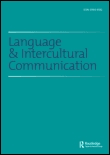
Language and Intercultural Communication
Scope & Guideline
Navigating the Complexities of Communication Across Cultures
Introduction
Aims and Scopes
- Intercultural Communication Practices:
The journal emphasizes the study of communication practices that occur between individuals from different cultural backgrounds, exploring how language functions in these interactions. - Language Education and Pedagogy:
A significant focus is on pedagogical approaches to teaching languages that foster intercultural competence and sensitivity among learners. - Research Methodologies:
The journal promotes innovative research methodologies, including qualitative and ethnographic studies, to understand the nuances of language use in intercultural contexts. - Power Dynamics in Communication:
It explores the power relations embedded in language use and intercultural communication, particularly in relation to marginalized groups and issues of identity. - Digital Communication and Globalization:
The impact of digital communication on intercultural exchanges is a growing area of interest, examining how technology influences language and cultural interactions.
Trending and Emerging
- Intercultural Competence Development:
There is a growing focus on frameworks and practices aimed at developing intercultural competence among learners, particularly in higher education settings. - Digital and Virtual Interactions:
Research on the role of digital platforms and virtual exchanges in facilitating intercultural communication is increasingly prominent, reflecting the impact of globalization. - Language and Identity Negotiation:
Emerging studies are highlighting how individuals negotiate their identities through language in multicultural environments, especially among international students. - Ethnographic and Reflexive Research Methods:
The use of ethnographic and reflexive methodologies to explore language practices and intercultural dynamics is trending, emphasizing the importance of context and researcher positionality. - Critical Pedagogy and Social Justice:
Themes related to critical pedagogy and social justice are gaining traction, focusing on how language education can address issues of power, equity, and inclusion in diverse classrooms.
Declining or Waning
- Traditional Linguistic Studies:
There appears to be a waning interest in traditional linguistic studies that focus solely on grammar and syntax without considering cultural contexts. - Static Models of Culture:
The journal has shifted away from static models of culture, which view cultures as fixed entities, towards more dynamic and fluid understandings of culture. - National Identity in Language Education:
There is less emphasis on national identity as a central theme in language education, reflecting a broader trend towards globalization and transnational identities. - Binary Approaches to Language Proficiency:
The journal has moved away from binary classifications of language proficiency (e.g., native vs. non-native) in favor of more nuanced understandings of language use and competence. - Cultural Essentialism:
Research that promotes cultural essentialism, viewing cultures as homogeneous and unchanging, is declining in favor of perspectives that embrace cultural hybridity and intersectionality.
Similar Journals
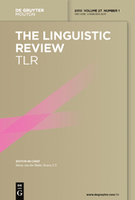
LINGUISTIC REVIEW
Fostering Scholarly Dialogue in Linguistic Research.LINGUISTIC REVIEW is a prestigious academic journal published by De Gruyter Mouton that has established itself as a leading platform in the field of Linguistics and Language. With an impressive impact factor and categorized in the Q1 Quartile for the year 2023, this journal ranks within the top tiers of its discipline, indicating its influential contributions to linguistic research. Covering an extensive range of topics from theoretical frameworks to applied linguistics, the journal aims to foster scholarly dialogue and advance the understanding of language in its myriad forms. Researchers and students alike will benefit from the rigorous peer-review process and the availability of in-depth studies published from 1981 onwards. While the journal is not open access, it is renowned for its exceptional quality and relevance in both the Arts and Humanities and Social Sciences classifications, with Scopus rankings placing it in the top percentile of its peers. By offering insight from leading scholars, LINGUISTIC REVIEW remains an indispensable resource for those who are passionate about linguistic inquiry and its real-world applications.
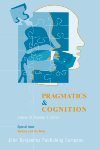
Pragmatics & Cognition
Fostering Insightful Dialogues on Language and ThoughtPragmatics & Cognition, published by John Benjamins Publishing Co, is an esteemed journal that serves as a cross-disciplinary platform for the study of language, cognition, and context-dependent communication. With its ISSN 0929-0907 and E-ISSN 1569-9943, the journal has established a notable reputation since its inception in 1993, although its coverage spans various fields from behavioral neuroscience to linguistics and philosophy. Recognized for its scholarly contributions, it holds impressive Scopus rankings, significantly within Linguistics and Language, where it ranks in the 63rd percentile among peers. Although it currently maintains a Q4 designation in Behavioral Neuroscience and a Q1 in Linguistics and Language as of 2023, the journal appeals to a diverse audience addressing the intricate relationships between language use and cognitive processes. As researchers and academics navigate this evolving landscape, Pragmatics & Cognition remains pivotal in fostering essential dialogues and advancing knowledge in the interdisciplinary field, providing rich content that is both insightful and relevant.

MODERNA SPRAK
Empowering Emerging Scholars in LinguisticsMODERNA SPRAK, published by LMS-Modern Language Teachers Association, is a vital journal in the field of linguistics and language studies that has been contributing to academic discourse since its inception in 2002. With an ISSN of 2000-3560, this Swedish journal provides a platform for researchers, educators, and language enthusiasts to explore contemporary issues and advancements in linguistics. Despite its Q4 category ranking in the 2023 category quartiles, its focus on diverse linguistic perspectives and innovative methodologies ensures its continued relevance and importance. As of 2023, it holds notable ranks within Scopus, placing it within the lower percentile of its categories—yet this offers a unique opportunity for emerging scholars to contribute to its growth and visibility. While MODERNA SPRAK is not an open access journal, it serves as a rich resource for academic networking and knowledge sharing in the evolving landscape of language education and research. The journal's commitment to fostering scholarship within an inclusive framework makes it an essential read for those engaged in the language sciences across various educational contexts.

Circulo de Linguistica Aplicada a la Comunicacion
Connecting Ideas Across Linguistic FrontiersCirculo de Linguistica Aplicada a la Comunicacion is a premier open-access journal published by UNIV COMPLUTENSE MADRID, SERVICIO PUBLICACIONES, since 2000, that serves as a vital resource for researchers, professionals, and students in the fields of linguistics and language studies. With an ISSN of 1576-4737, this journal is recognized for its rigorous scholarship and has achieved a notable Q1 quartile ranking in Linguistics and Language as of 2023. The journal's impact extends across diverse domains, holding significant positions in both the Arts and Humanities and Social Sciences categories, ranking #354/1088 and #419/1167 in Scopus, respectively. It features a rich array of research articles that delve into applied linguistics, communication theories, and language pedagogy, creating a comprehensive platform for academic discourse. By fostering collaboration and innovation in language research, Circulo de Linguistica Aplicada a la Comunicacion remains a crucial contributor to the enrichment of knowledge and understanding within the global linguistic community.
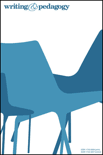
Writing & Pedagogy
Empowering Educators with Cutting-Edge ResearchWriting & Pedagogy is a renowned academic journal published by EQUINOX PUBLISHING LTD that aims to explore the dynamic interplay between writing and teaching methodologies within the fields of education and linguistics. Since its launch, the journal has rapidly become a vital resource for scholars, practitioners, and students interested in the evolving landscape of literacy, composition, and educational practice. The journal is indexed in Scopus, highlighting its relevance and contribution to the fields, with a current ranking of #499 in Language and Linguistics and #578 in Social Sciences within Linguistics. With a Q4 classification in Education and a Q3 classification in Linguistics and Language as of 2023, it reflects a commitment to quality scholarship while offering open access to a wide range of articles that promote innovative pedagogical approaches. As the journal converges from 2018 to 2023, it continues to attract contributions that push the boundaries of traditional discourse, making it an essential read for anyone engaged in the vital work of writing education and pedagogy.
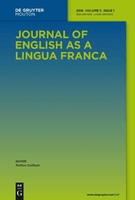
Journal of English as a Lingua Franca
Connecting Communities Through Shared LanguageJournal of English as a Lingua Franca, published by WALTER DE GRUYTER GMBH, stands at the forefront of academic discourse in the fields of linguistics and communication. With an impressive impact factor placed in the Q1 and Q2 quartiles for Linguistics and Communication respectively, this journal serves as a critical platform for researchers and educators interested in the dynamics of English as a global lingua franca. Since its inception in 2012, the journal has actively contributed to the understanding of language use across diverse communities and contexts, addressing the implications of English as a shared mode of communication. Housed in Germany, the journal's open-access model fosters accessibility and encourages knowledge sharing within the global academic community. By providing rigorous peer-reviewed articles, the Journal of English as a Lingua Franca remains an essential resource for those committed to advancing research in this vibrant linguistic landscape.
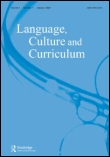
Language Culture and Curriculum
Elevating Language Learning in Cultural ContextsLanguage Culture and Curriculum is a premier academic journal published by Routledge Journals, Taylor & Francis Ltd, dedicated to advancing knowledge in the fields of Education and Linguistics. With a distinguished history since 1988 and converging through to 2024, this journal is highly regarded, reflecting its exemplary standing with a 2023 Q1 ranking in both Education and Linguistics. Currently among the top 3% of publications in Language and Linguistics and ranked 27th in Social Sciences, Language Culture and Curriculum fosters the exploration of language education within diverse cultural contexts. Through rigorous peer-reviewed research, it serves as an essential platform for researchers, educators, and policymakers alike, promoting innovative practices and theoretical frameworks in language teaching and curriculum development. Although it does not offer Open Access, the journal remains an invaluable resource in academic circles, supporting scholarly discourse and advancing educational methodologies.
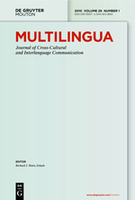
Multilingua-Journal of Cross-Cultural and Interlanguage Communication
Exploring the Rich Tapestry of Multilingual CommunicationMultilingua: Journal of Cross-Cultural and Interlanguage Communication is a premier academic journal published by DE GRUYTER MOUTON, specializing in the dynamic fields of communication and linguistics. Established in 1982, this journal has significantly contributed to the discourse surrounding multilingualism, intercultural interactions, and language acquisition, with a notable reputation backed by an impressive Q1 ranking in both Communication and Linguistics and Language for 2023. Positioned strategically at the heart of Germany, the journal serves as a vital platform for researchers, professionals, and students alike, fostering scholarly exchange and insights into cross-cultural communication practices. With rankings placing it in the top percentiles across key categories in Scopus, including Arts and Humanities and Social Sciences, Multilingua exemplifies the highest standards of academic excellence. Although currently not an Open Access journal, it continues to provide a wealth of knowledge to the global research community.
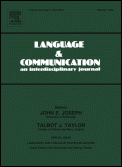
LANGUAGE & COMMUNICATION
Advancing the frontiers of language and interaction.LANGUAGE & COMMUNICATION is a prestigious journal published by PERGAMON-ELSEVIER SCIENCE LTD that serves as an essential resource for researchers and practitioners in the fields of communication, linguistics, and psychology. With a focus on interdisciplinary approaches, this journal has maintained a strong impact, as evidenced by its high rankings—Q1 status in communication and linguistics, and notable categories in experimental and cognitive psychology, as highlighted by the 2023 Scopus rankings. Established in 1981, LANGUAGE & COMMUNICATION combines rigorous empirical research with practical applications, making it a critical forum for advancing understanding in language use and communication theory. While currently not an Open Access journal, it offers vital insights to academics and professionals alike, facilitating knowledge dissemination and sparking meaningful dialogue within the community. Its commitment to excellence is further demonstrated by its contributions to key areas of study, positioning it as a vital publication for anyone invested in the exploration of language and human interaction.

Intercultural Pragmatics
Pioneering Research at the Intersection of Language and Culture.Intercultural Pragmatics, published by De Gruyter Mouton in Germany, stands at the forefront of the study of communication across diverse cultures, bridging the gap between linguistic theory and real-world intercultural exchanges. With an ISSN of 1612-295X and an E-ISSN of 1613-365X, this esteemed journal has been contributing to the field since its inception in 2004, showcasing rigorous scholarship through its convergence of literature up to 2024. The journal enjoys a commendable reputation, positioned in the Q2 quartile of Communication and the Q1 quartile of Linguistics and Language, reflecting its significant impact within the academic community. As recognized in Scopus rankings, it is ranked #122 out of 1088 in Arts and Humanities (Language and Linguistics) and holds an impressive 88th percentile, making it an essential resource for researchers, professionals, and students eager to deepen their understanding of intercultural dynamics. While access options remain standard, the journal prioritizes groundbreaking insights and theoretical advancements that contribute to the ever-evolving landscape of linguistics and intercultural communication.